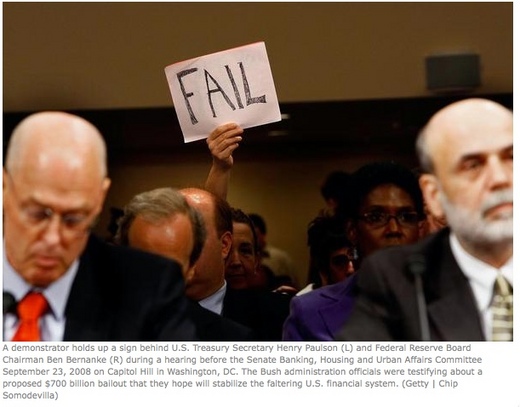 I don't think I've ever done that before. Let's see: war, homophobia, racism, climate change denial, fraud, hypocrisy. Nope, never agreed with them on any of that. Yet the $700bn plan to nationalise US banking losses put Obama on the wrong side, backing Bush despite the cost to his own plans, while the only congressional opposition came from the Republicans, specifically Senator Shelby, who said:
I don't think I've ever done that before. Let's see: war, homophobia, racism, climate change denial, fraud, hypocrisy. Nope, never agreed with them on any of that. Yet the $700bn plan to nationalise US banking losses put Obama on the wrong side, backing Bush despite the cost to his own plans, while the only congressional opposition came from the Republicans, specifically Senator Shelby, who said:"What troubles me most is that we have been given no credible assurances that this plan will work. We could very well spend $700 billion or $1 trillion and not resolve the crisis. Before I sign off on something of this magnitude, I would want to know that we have exhausted all reasonable alternatives. But I don't believe we can do that in a weekend."
Now, they've got absolutely the wrong end of the stick about the plan. Republican Senator Jim Bunning said the plan was "financial socialism, and it's un-American". I always thought socialism was about giving money from the rich to the poor, not the other way round as per the Bush/Paulson/Bernanke plan, but perhaps I misread Uncle Karl. While their specific concerns are not the same as mine - 180 degrees away, in fact, given my sympathies are with this lot - the conclusion was the same. This plan is bonkers and it won't work.
But now even the Republican opposition has collapsed - presumably they finally worked out that the plan was a massive give-away to their pals - and it'll all go through. Will the credit ratings agencies now do what they'd do to anyone else picking up these toxic debts, and mark down the US Government for the first time from AAA? If you're looking for signs of the impending end of the American imperial phase, that would be a pretty clear one.
Incidentally, over here, the New Labour response is as weak and captured by the markets as the Obama response. Will Hutton wrote today, backing the scheme, that "Once again, the left is coming to capitalism's rescue". Is this a model of capitalism the left should really want to rescue, even with his sea of caveats?
Brown's response was also a mass of absurdities and inconsistencies. He decried the "age of irresponsibility" which he himself has sponsored, then in the next breath said:
"I have told President Bush today that facing global turbulence Britain supports the US plan. Whatever the details of it, it is the right thing to do."
Isn't it irresponsible to support a plan like this irrespective of the details? It's the classic failed politician's response, and it goes like this. Something must be done, and this is something, therefore this must be done. We should perhaps be grateful that this time he's not recommending wasting our money. Nevertheless, this whole scenario feels as though the Joker or the KLF have been put in charge of the global banking system.







